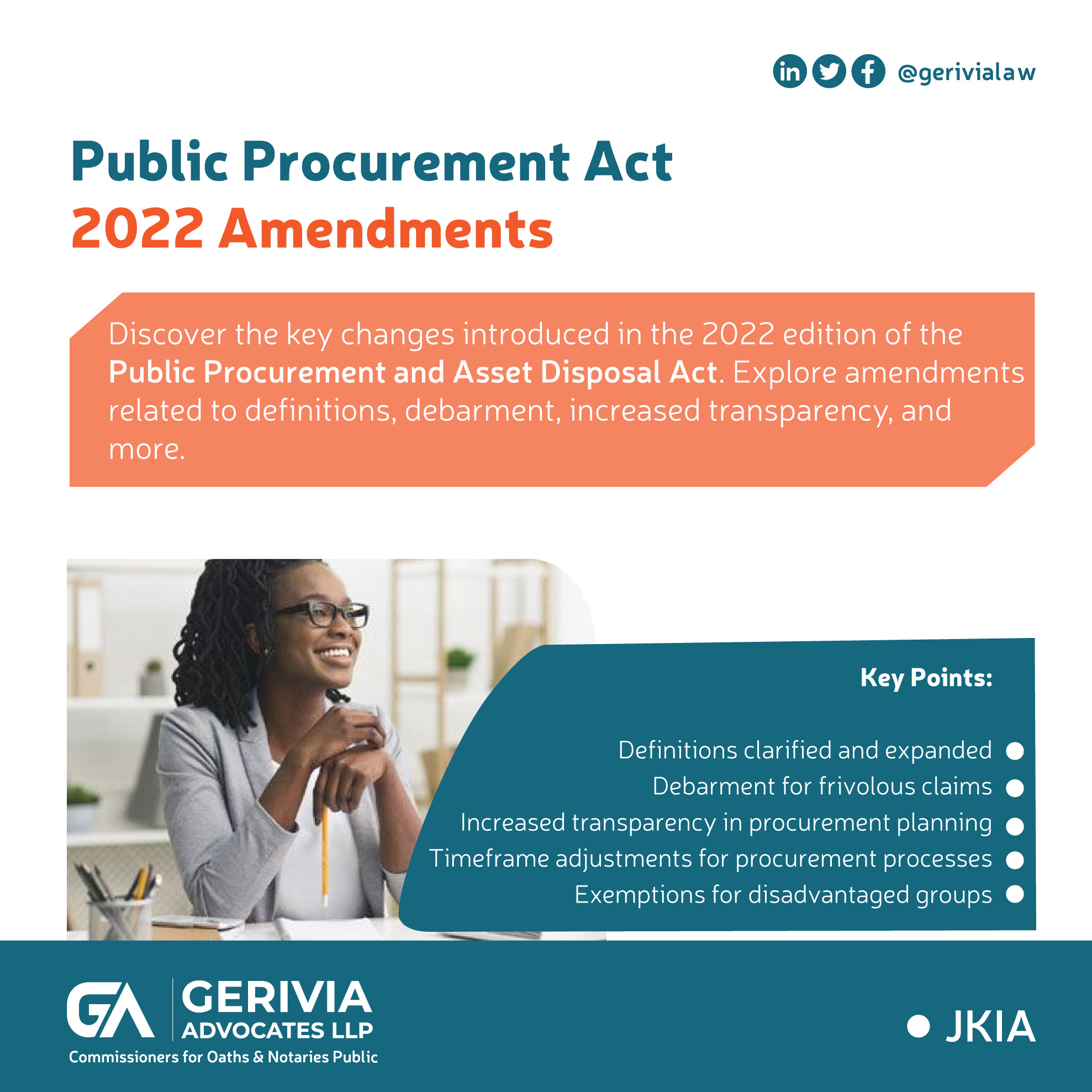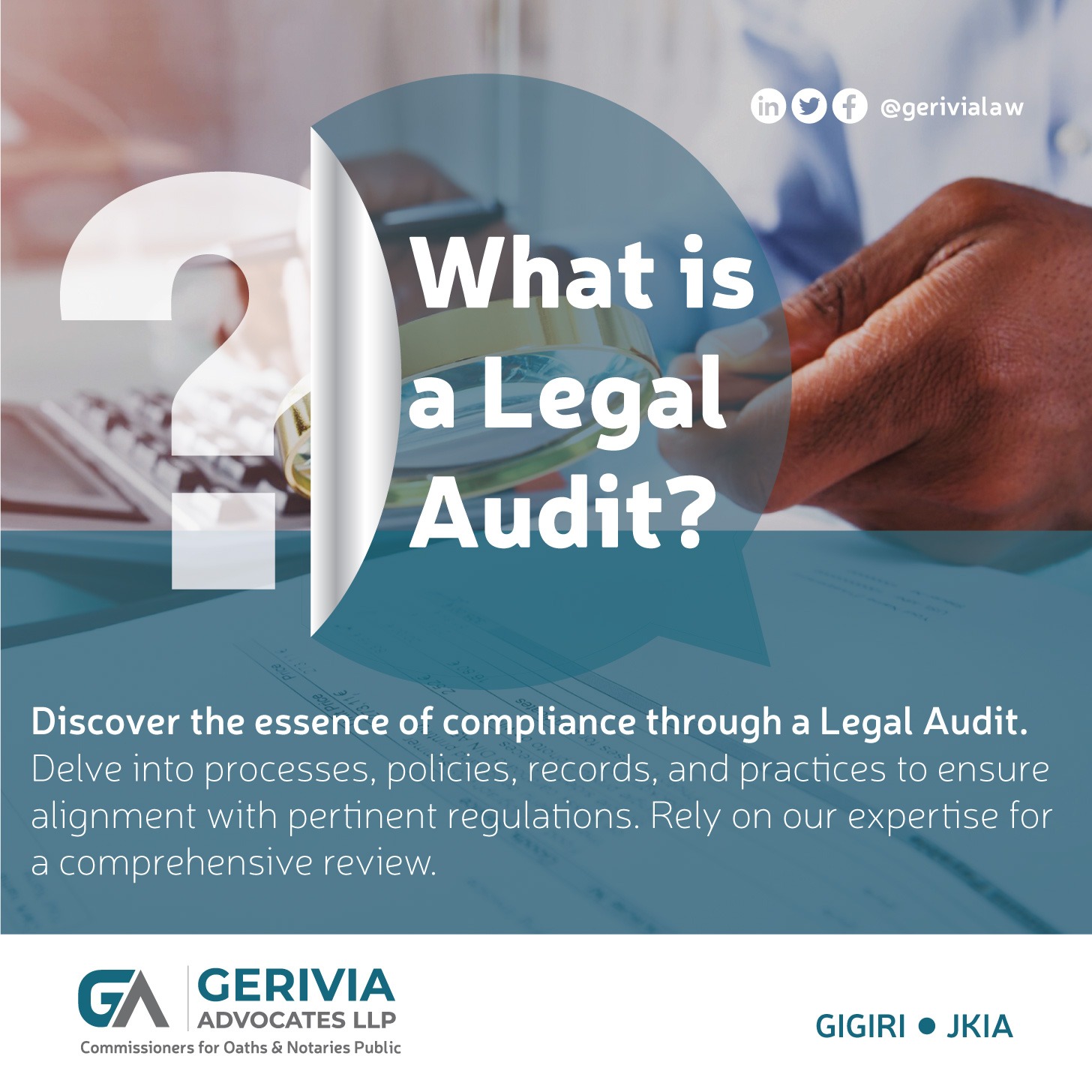The criteria are listed under Section 55 of the Public Procurement and Asset Disposal Act (hereinafter the “Act”) and include:
The person has the legal capacity to enter into a contract for procurement or asset disposal. Capacity to contract means the legal competence of a person to enter into a valid contract. Ordinarily, capacity to contract refers to the capacity to enter into a legal agreement and the competence to perform some act. The basic element to enter into a valid contract is that a person has sound mind.
A sane, sober person of contractual age is capable of making a valid contract. There are certain classes of people who are exempt from the category of people who are capable of entering into a contract such as infants/minors and mentally ill persons.
Section 2 of the Age of Majority Act, Cap 33 Laws of Kenya states: “A person shall be of full age and cease to be under any disability by reason of age on attaining the age of eighteen years”. Section 2 of the Children Act, 2001 defines a child as any human being under the age of eighteen years. The Infants Relief Act 1874, an English Act which applies in Kenya describes an infant’s contractual position. According to the Infants Relief Act, contracts for goods, other than necessaries, loans of money and accounts are absolutely void.
Just like the law protects infants/minors, the law also protects persons who are mentally ill or under the influence of alcohol from people who might attempt to take advantage of them. For a person to have legal capacity to contract, such a person must be sane and sober. A person will be considered insane or not sober if the incapacity causes the affected person not to fully appreciate what he is doing, and the other contracting party must be aware of that incapacity.
Companies or corporations, duly registered under the Companies Act of Kenya, are regarded as a legal person capable of making contracts in its own name through its duly authorized agents. However, a company’s contractual powers may be limited in the Memorandum of Association (a document where a company sets down in its Objects Clause, the various functions, and purposes of the company). All contracts that a company makes must be within the Objects Clause. If the contracts are within the Objects Clause, they are valid and described as intra vires. If the contracts go outside the limits of the Objects Clause, then they are invalid as being ultra vires. [See Ashbury Railway Carriage and Iron Co. Ltd vs Riche (1875) 44 L.J. Ex 185]
The person is not insolvent, in receivership, bankrupt or in the process of being wound up. Persons who are bankrupt still have general capacity to enter into contracts, however they are subject to some limitations and their trustee in bankruptcy can intervene and disclaim contractual obligations for a number of reasons. Therefore, it is important for procuring entities to be cautious when conducting contractual dealings with a bankrupt.
The person, if a member of a regulated profession, has satisfied all the professional requirements. This can be illustrated by way of example as follows: Advocates in Kenya are members of Law Society of Kenya and are required to take out practicing certificates every year. A procuring entity, while inviting bids for provision of legal services, will require proof that the Advocates submitting bids, have taken out practicing certificates and may even require proof that said Advocates are duly recognized by the Law Society of Kenya.
The procuring entity is not precluded from entering into the contract with the person under Section 38 of the Act. Under Section 35 of the Act, the Public Procurement Regulatory Authority (the “Authority”) may undertake investigations, at any reasonable time, by among other things examining the records and accounts of the procuring entity and contractor, supplier or consultant relating to the procurement or disposal proceeding or contract with respect to a procurement or disposal with respect to a State organ or public entity for the purpose of determining whether there has been a breach of the Act or the Public Procurement and Asset Disposal Regulations (the “Regulations”).
For purposes of an investigation, the Authority appoints an investigator who after completing the investigations, prepares and submits a report to the Authority. Pursuant to Section 38 of the Act, if after considering the report of an investigator, the Director-General of the Authority is satisfied that there has been a breach of the Act, the Regulations, or any directions of the Authority, the Director-General may, by order, direct the procuring entity to take such actions as are necessary to rectify the contravention, terminate the procurement or asset disposal proceedings, prepare and submit a summary of the investigator’s findings and recommendations to the relevant authorities for action or require the procuring entity to transfer procuring responsibilities of the subject procurement to another procuring entity.
The person and his or her sub-contractor, if any, is not debarred from participating in procurement proceedings under Part IV of the Act. A person may be debarred from participating in procurement or asset disposal proceedings by the Authority or the Public Procurement Administrative Review Board (the “Board”).
The Board shall debar a person on the ground that the person has committed an offence under the Act, has committed an offence relating to procurement under any other Act or Law of Kenya or any other jurisdiction, has breached a contract for a procurement by a public entity including poor performance, has, in procurement or asset disposal proceedings, given false information about his or her qualifications.
The Board shall also debar a person on the ground that the person has refused to enter into a written contract as required under Section 135 of this Act, has breached a code of ethics issued by the Authority pursuant to Section 181 of the Act or the code of ethics of the relevant profession regulated by an Act of Parliament, has defaulted on his or her tax obligations.
Further, the Board shall debar a person on the ground that the person is guilty of corrupt or fraudulent practices, or is guilty of a serious violation of fair employment laws and practices, has breached the requirements of the tender securing declaration form in the tender documents or has not performed according to professionally regulated procedures.
The Authority may debar a person from participating in procurement or asset disposal proceedings on the recommendation of a law enforcement organ with an investigative mandate.
The person has fulfilled tax obligations. A person who wishes to take part is procurement and disposal proceedings must have fulfilled their obligations to pay tax, and for this purpose, documentary evidence has to be provided to demonstrate that it has fulfilled his obligations to pay taxes. [See PPCRB Application 22 of 2005 MFi Office Solutions Ltd vs Department of Defence].
The person has not been convicted of corrupt or fraudulent practices. Under Section 2 of the Anti-Corruption and Economic Crimes Act, corruption means bribery, fraud, embezzlement or misappropriation of public funds, abuse of office, breach of trust or an offence involving dishonesty—in connection with any tax, rate or impost levied under any Act; or under any written law relating to the elections of persons to public office.
The requirement that a person should not be convicted of corrupt or fraudulent practices should be read with Section 62 of the Act which requires a tender, proposal or quotation submitted by a person shall include a declaration that the person will not engage in any corrupt or fraudulent practice and a declaration that the person or his or her sub-contractors are not debarred from participating in procurement proceedings.
The person is not guilty of any serious violation of fair employment laws and practices. The right to fair labour practice is enshrined as a fundamental right and freedom under Article 41 of the Constitution. In Kenya, fair employment laws and practices prohibit employers from discriminating based on sex, pregnancy, marital status, health status, ethnic or social origin, colour, age, disability, religion, conscience, belief, culture, dress, language, or birth. Fair employment practices also require employers to fairly remunerate their employees and to provide reasonable working conditions.
CONCLUSION
If you have legal capacity to enter into a contract , you are not insolvent, in receivership, bankrupt or in the process of being wound up, you have satisfied all professional requirements (if a member of a regulated profession), you are not debarred from participating in procurement proceedings, you have fulfilled all your tax obligations, you have not been convicted of corrupt or fraudulent practices and you are not guilt of any serious violation of fair employment laws and practices, then you are eligible to bid for a contract in procurement or an asset being disposed.




